The singing soul of the civil rights movement
Mahalia Jackson was much more than just an extraordinary singer. Her deep conviction for social justice, her tireless dedication, and her unique ability to inspire people through music made her a central and multifaceted force in the American civil rights movement. Her influence ranged from raising funds to directly inspiring leaders such as Martin Luther King Jr., making her an icon of the struggle for equality.
Gospel as hope and resistance
For Mahalia Jackson and the African American community, gospel music was not just a form of entertainment, but a fundamental source of hope, comfort, and spiritual strength in times of extreme hardship and discrimination. As Betty Lester explained, gospel songs kept people from losing their minds and gave them hope that things would get better if they trusted in God.
Mahalia herself saw gospel as a message that went deeper and lasted longer than secular music such as jazz or blues. She distinguished the blues as the cry of a person standing alone in a deep pit, crying out for help, while gospel was described as the singing of a person in an open field, asking the Lord for something beautiful. This deeply rooted conviction shaped her artistic integrity and her refusal to perform blues music, even under commercial pressure.
Her happiest moment in life was not public applause, but a quiet, personal moment when she felt she had "found favor in the eyes of the Lord" and was recognized as a Christian. This deep spirituality was the driving force behind her tireless dedication.
Pioneer and active supporter of the movement
Mahalia Jackson's commitment to the civil rights movement began in 1956 when she was invited to sing at an event in support of the Montgomery bus boycott. When asked about her fee, she replied to Reverend Ralph Abernathy, "I'm not going to charge the pilgrims." This made her the first artist to give a concert to raise money for the civil rights movement.
She had a close and trusting relationship with Dr. Martin Luther King Jr., for whom she was an important source of support. Her home in Chicago became an unofficial "headquarters" for the civil rights movement in the city, where meetings and fundraisers were held. King valued her advice and often called her when he was feeling down to draw "spiritual strength" from her a cappella renditions of his favorite songs; he called her "practically his muse."
During the 1963 March on Washington for Jobs and Freedom, she sang the moving song "I Been 'Buked and I Been Scorned." An often-quoted anecdote has it that she shouted to Dr. King during his speech, "Tell 'em about the dream, Martin, tell, Martin, tell 'em 'bout the dream!" inspiring him to deliver his famous improvised passage. She saw the speech as an expression of rhythms and intonations that evoked the struggle, pain, and torment of the past and pointed to the possibility of triumph. She was an advocate of nonviolence and Christianity and advised people not to lose heart or determination, even when they doubted and despaired.
Personal experiences with discrimination
Mahalia Jackson repeatedly experienced discrimination on her travels in the South, where she was often denied food and accommodation despite her fame. Her statement that she immediately felt "like I was in the jungle" after a concert illustrates the harsh reality of Jim Crow laws.
She emphasized the importance of performing in front of integrated audiences and often threatened not to sing if organizers attempted to segregate seating by skin color, which often resulted in integrated venues.
Economic and social commitment
Mahalia Jackson's efforts went beyond the stage. She actively planned and pursued the construction of a "race-crossing, non-denominational, evangelistic temple" in Chicago. This temple was also intended to be an educational and training facility for young people, as she believed that "with ignorance there can never be peace." She saw this as the culmination of her life and was determined to make it happen with her own money and through fundraising, despite the skepticism and criticism of those around her.
She started the fried chicken chain Mahalia Jackson's Fried Chicken with the goal of promoting black ownership and black employment and creating franchise opportunities in black communities. Her business philosophy was to make money to enable economic vitality in the black community and "transform communities of black service providers into an army of black business owners." She argued that people must "be fed first" before one can talk about salvation. She also founded the Mahalia Jackson Foundation, which awards scholarships to college students to promote education.
She expressed frustration at the lack of participation by other wealthy Black artists in the movement and was willing to join picket lines to stand up for her own freedom and raise money for bail.
Influence and international presence
Mahalia Jackson was a staunch Democrat and supported many political campaigns. She did not see herself as "political" but always stood up for "the good cause." As early as the 1930s, she supported the Democratic Party by rewriting songs for congressional candidate William L. Dawson and singing at his rallies. She maintained close relationships with politicians such as Chicago Mayor Richard J. Daley, who held her in high esteem. She used her influence to advance issues important to the African American community, such as protection for protesters.
She criticized the government for treating African Americans "like provoked children" and emphasized the need for understanding and dialogue between whites and blacks. Despite her preference for nonviolence, she was pragmatic. She noted that "Muslim people are doing more than the rest of us" by buying their own fields and factories and building their own economy instead of just talking. This showed her openness to different paths of self-help and empowerment.
She played an international diplomatic role. Her numerous tours to Europe and Asia (including Japan and India) were not only artistic successes, but also platforms for spreading the message of freedom and love. During her performances abroad, she was often celebrated as the epitome of American authenticity. Her concert in India even impressed Prime Minister Indira Gandhi, who declared that she would "never hear a greater voice; never meet a greater human being." She also used her fame to send open letters to heads of state such as Mrs. Gandhi.
Dr. Martin Luther King
The relationship between gospel icon Mahalia Jackson and civil rights leader Rev. Dr. Martin Luther King Jr. was a profound alliance marked by mutual respect, deep friendship, and an unwavering commitment to the civil rights movement. Their connection was one of spiritual power and political drive that helped shape the landscape of the struggle for equality in the United States.
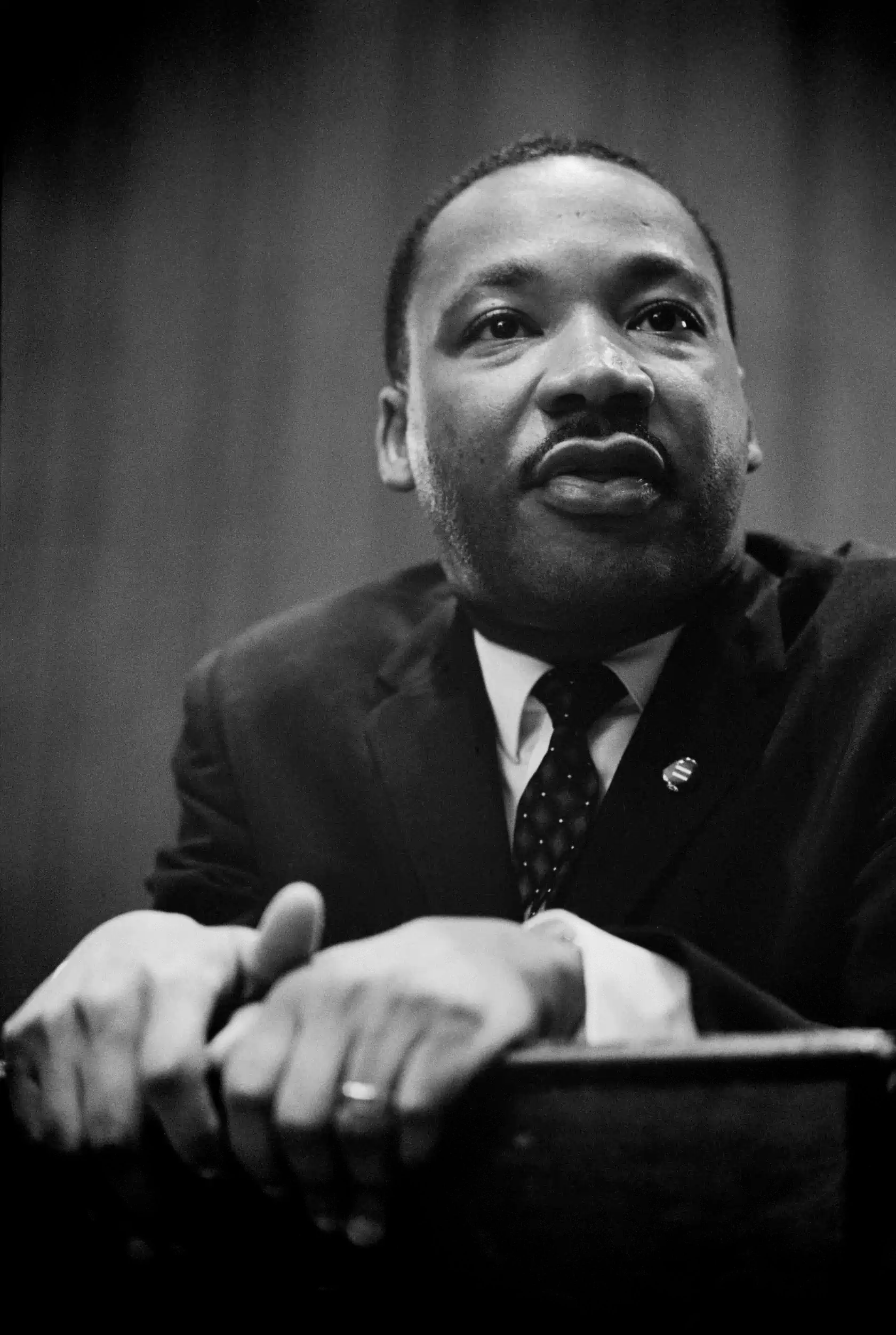
© Geopix/Alamy. Dr. Marin Luther King, Press conference, March 26, 1964
The beginning of a deep connection
Mahalia Jackson's involvement in the civil rights movement began in 1956 when she was invited by Rev. Ralph David Abernathy to perform at an event in support of the Montgomery bus boycott. This boycott, which began on December 1, 1955, after Rosa Parks was arrested for refusing to give up her seat, was a turning point in the movement. King, as the newly appointed pastor of Dexter Avenue Baptist Church, was a co-organizer of the Montgomery Improvement Association (MIA), which coordinated the boycott of the city's bus lines.
Jackson agreed to sing for free, saying, "I don't charge the wanderers." This made her the first person to give a concert to raise money for the civil rights movement. While in Montgomery, she stayed with the Abernathys, where they ate, prayed, and went to church together. This first visit developed into a close friendship with King and his colleagues, which was strengthened by mutual visits and joint activities.
Mahalia's unwavering support
Mahalia Jackson was a staunch Democrat and saw King's humanitarian efforts as a gift to humanity. She often sang at rallies, including boycott events, Southern Christian Leadership Conference (SCLC) conferences, and the third anniversary of the Brown v. Board of Education decision. Her influence was far-reaching, and she was even a member of the SCLC's board of directors.
Her home in Chicago, particularly on Indiana Avenue, became the "unofficial headquarters" of the civil rights movement in Chicago. It was here that King, Abernathy, and their advisors met to prepare speeches and raise funds. Jackson frequently called King to comfort him and give him strength. King drew "spiritual strength" from her singing and had "unquestioning faith" in Mahalia, whom he considered "practically his muse." She used her influence to encourage others to join the movement and organized benefit events to raise funds for the movement. A notable example was an all-star benefit concert at the Arie Crown Theater at McCormick Place on May 27, which was expected to raise fifty thousand dollars. King, Abernathy, and Wyatt Tee Walker participated in this event, which attracted over five thousand people. Their demand for integrated audiences at their concerts was also a clear statement against racism.
At an event with Martin Luther King, Mahalia spontaneously starts singing the song "Joshua Fit to Fight the Battle of Jericho"!
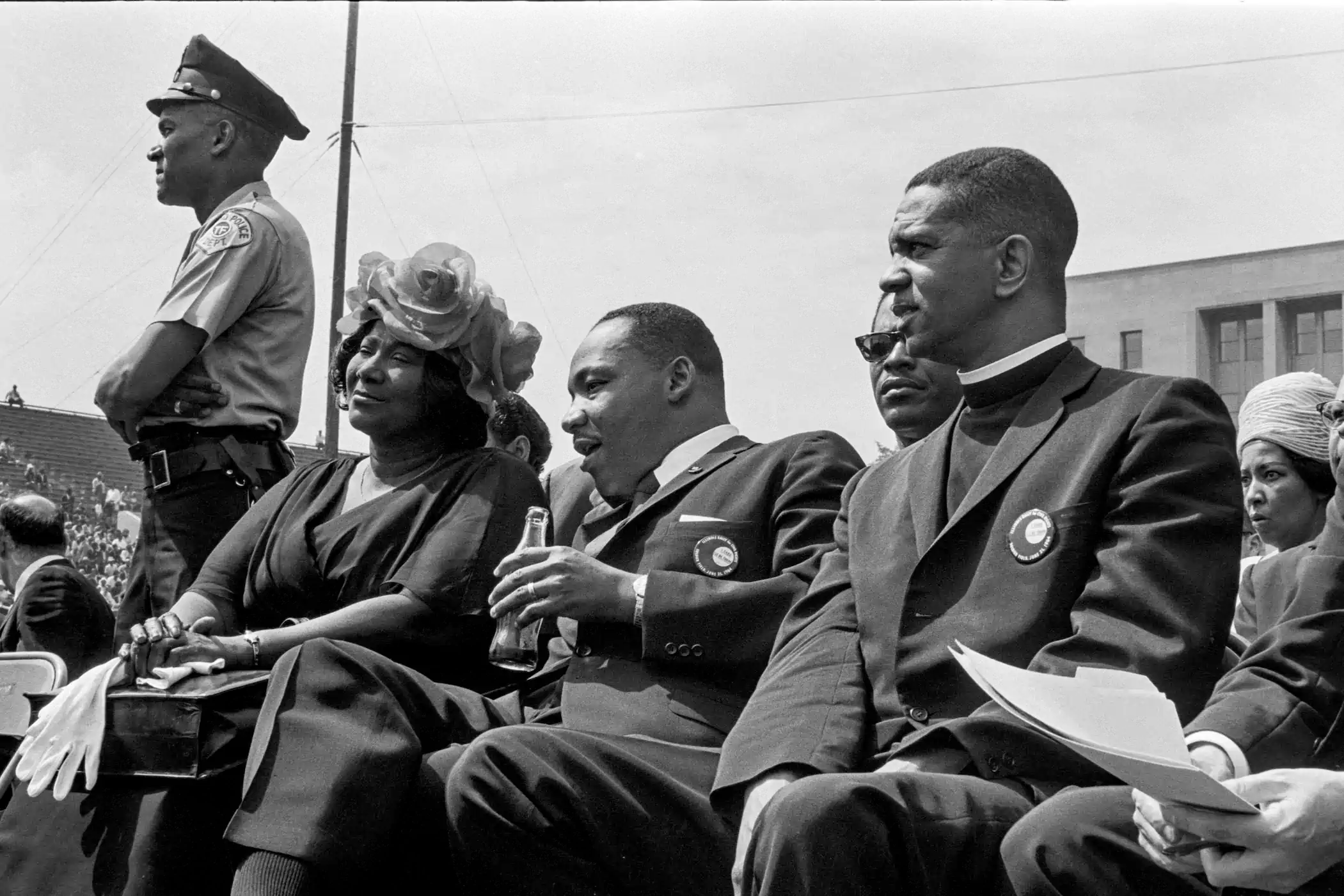
© Bildanbieter:John Tweedle/Alamy
Important shared events
Their journey together was marked by several key moments.
Prayer pilgrimage for freedom in 1957
Jackson was the main speaker at the Freedom Pilgrimage prayer rally on the steps of the Lincoln Memorial on May 17, 1957. The crowd was told not to clap to keep the event solemn.
Civil rights campaign in Chicago, 1963–1966
Mahalia Jackson defied established Baptist congregations in Chicago who were afraid to invite King and offered her support in bringing him to the city. She called Mayor Daley, who offered King a platform at McCormick Place Auditorium. Jackson even went with King to the police station to negotiate the release of young people. In June 1964, she led a 5,000-member choir at the Illinois Rally for Civil Rights at Soldier Field in Chicago, which was attended by 57,000 to 75,000 people.
March on Washington 1963
This was one of the most historic and iconic moments of her career. Jackson sang "I've Been Buked and I've Been Scorned" before King's speech. When a low-flying plane threatened to drown out her voice, Mahalia overcame the noise with her powerful voice. The crowd demanded more, and she responded by singing "How I Got Over." There are reports that Mahalia whispered to King when she sensed the energy waning, "Tell them about the dream, Martin." Martin Luther King then removed his prepared text and improvised the famous
„I Have a Dream“- Part of his speech. King later wrote her an extraordinary letter of thanks, attributing the inspiration and success of the march to her.
Martin Luther Kings Tod 1968
On April 4, 1968, King was assassinated. Mahalia was shocked and angry at the loss. At King's request, she sang Thomas Dorsey's "Take My Hand, Precious Lord" at his funeral on April 9, 1968. She later dedicated an album to his favorite religious songs. She joined the SCLC board to support Abernathy. After the assassinations of King and the Kennedys, Mahalia Jackson retired, deeply affected by the events.
The funeral of Dr. Martin Luther King Jr. took place on April 9, 1968, in his hometown of Atlanta, Georgia. First, there was a private funeral service at Ebenezer Baptist Church, where he and his father were pastors. This was followed by a public memorial service at Morehouse College, and a funeral procession with an estimated 50,000 people accompanied the coffin to South View Cemetery.
In 1977, his remains were reburied near the King Center in Atlanta, where he now rests alongside his wife, Coretta Scott King.
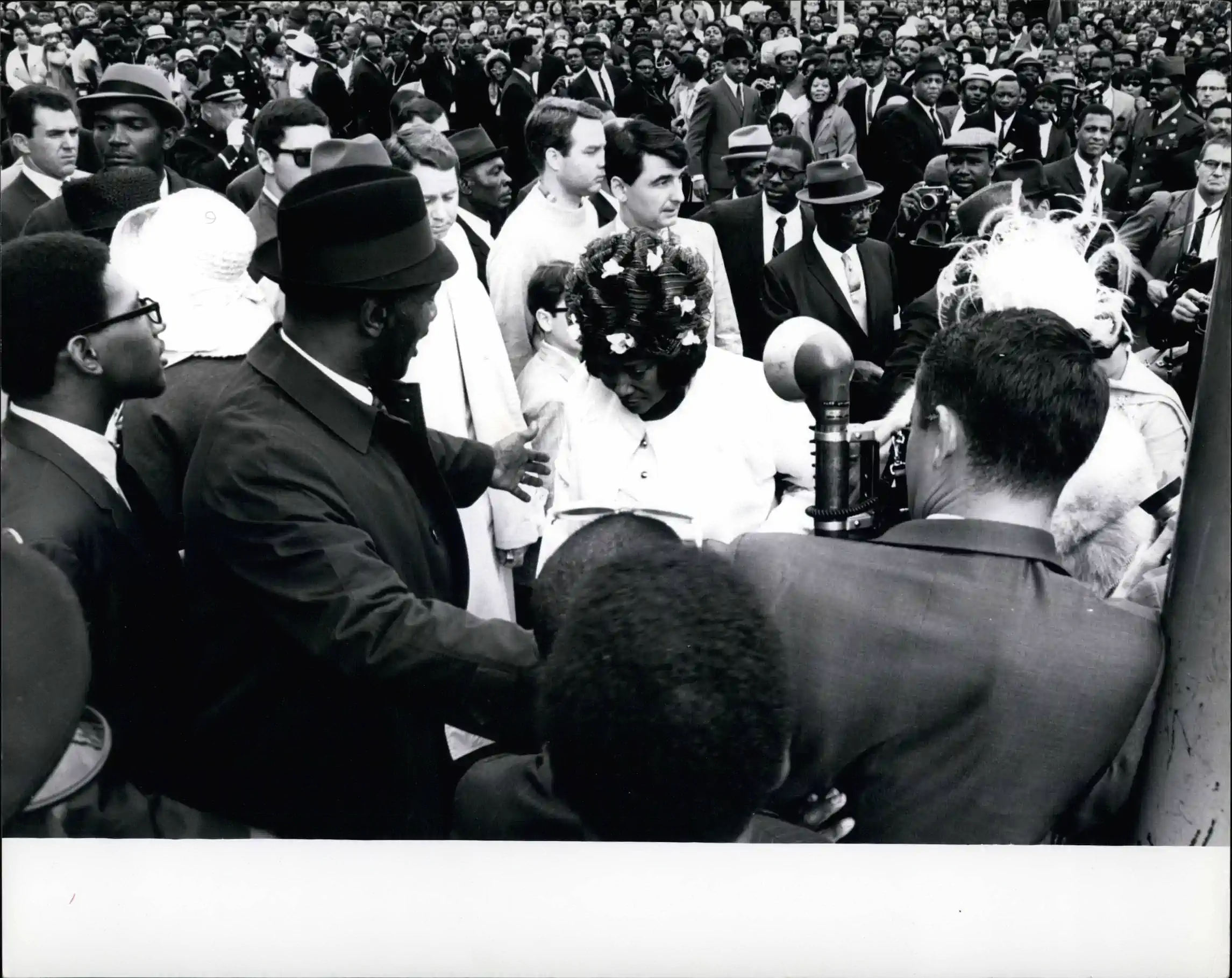
© Zuma Press/Alamy. Mahalia at the funeral of Dr. Martin Luther King
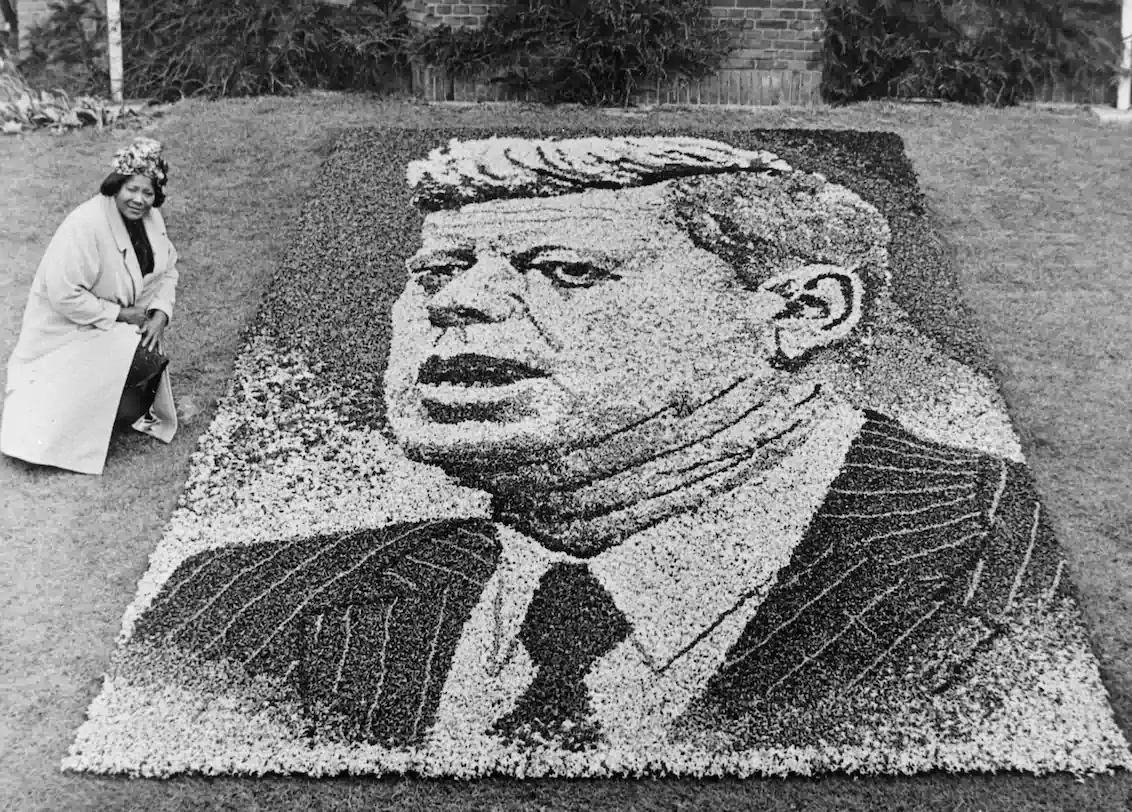
© Smith Archiv/Alamy. Flower portrait near Utrecht, Netherlands – May 8, 1964
Mahalia's personal beliefs about MLK
Mahalia Jackson saw King as a "living god" and the ground he walked on was sacred to her. King himself said of her, "A voice like that doesn't come once in a century, but once in a millennium." Mahalia said that even though King had so many worries, he could still laugh and smile. She also appeared on various television shows to spread her music and the message of the civil rights movement, including The Ed Sullivan Show, Dick Cavett, Merv Griffin, Jack Paar, and Flip Wilson.
The deep connection between Mahalia Jackson and Martin Luther King Jr. was a cornerstone of the civil rights movement. Their friendship, mutual respect, and shared commitment left a lasting mark on history and are a testament to the power of collaboration in the pursuit of justice.
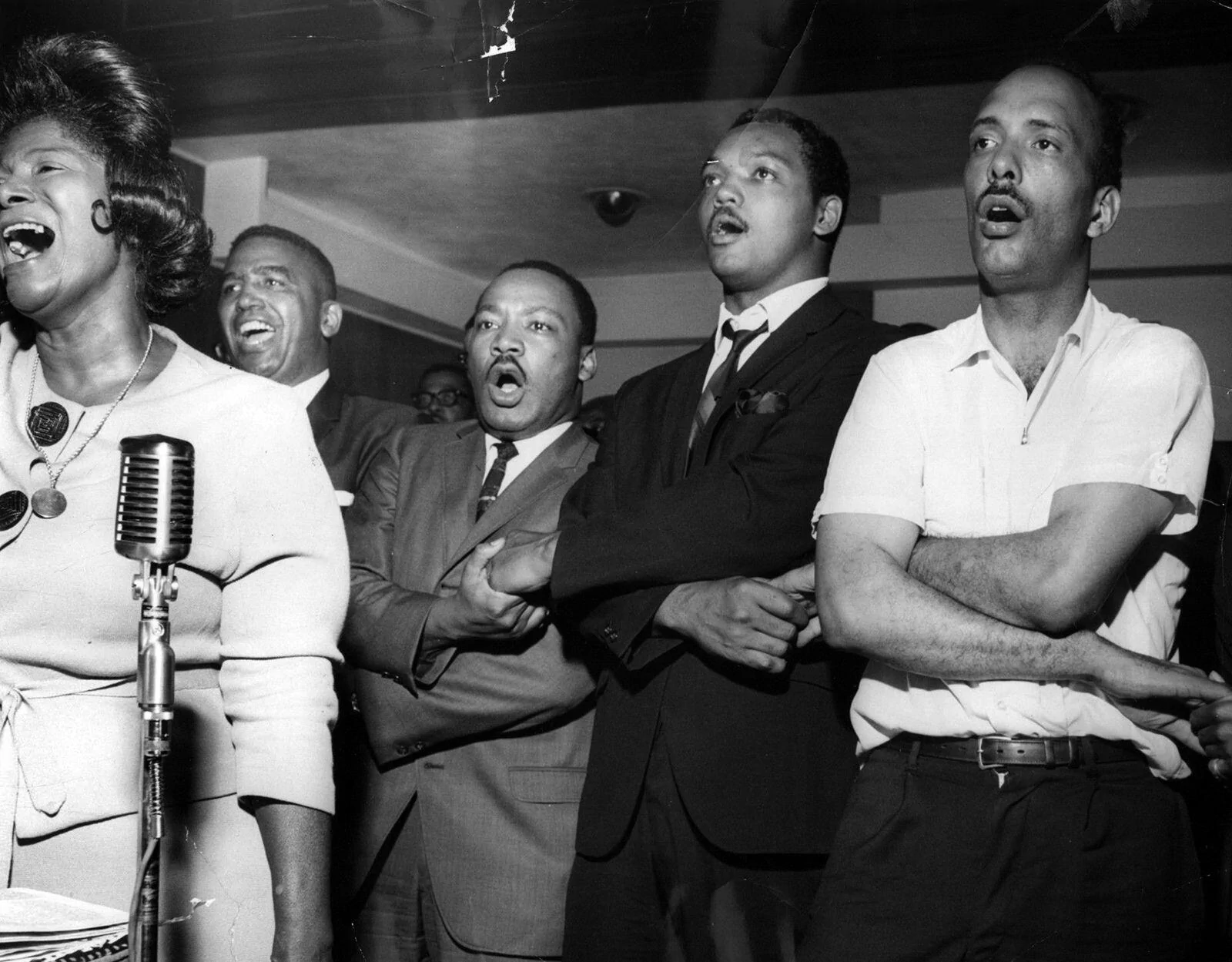
© Ray Foster/TNS via ZUMA Press Wire/Alamy
4. August 1966 844W 71st Chicago, Illinois
Dr. Martin Luther King, third from the right.
Jesse Jackson, second from the right.
Albert Rabi, right.
Challenges and perseverance
Her career was marked by numerous health problems, including uterine tumors, sarcoidosis, diabetes, and recurring shortness of breath. Despite medical warnings and extreme exhaustion, she continued her tours and her commitment because she felt obligated to fulfill her duties and knew that "people were counting on her." She said she had to do it because it was in her contract and "everyone can endure more than they think." Nevertheless, she was unwavering in her belief and determination to do good and promote freedom.
Mahalia Jackson's role in the civil rights movement was therefore a complex blend of deep spiritual devotion, artistic integrity, business acumen, and unwavering personal resilience, which made her a unique and indispensable figure in the struggle for equality and justice. Her voice and actions inspired countless people and left a legacy that continues to resonate today.
Despite much progress, the issues addressed by the civil rights movement have never lost their relevance. However, the drastic setbacks and the associated urgency we are experiencing today would have been almost unimaginable back then.
©Thilo Plaesser
In an interview conducted by Studs Terkel in 1963, Mahalia talks about her role in the civil rights movement.